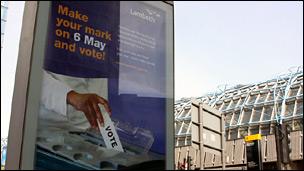Individual voter ID plan brought forward to 2014
- Published

It is estimated that more than three million people are missing from the electoral register
The government plans to speed up the introduction of compulsory individual voter registration in Britain.
Currently the head of a household is asked to list eligible voters and does not have to provide ID for them.
It was originally planned that voters would have to register themselves and provide ID from 2015 at the earliest.
Now ministers - who say they want to combat fraud and increase faith in the electoral system - aim to move that forward to 2014 for new voters.
But to prevent a big drop in the number of voters, those already on the electoral register will have until after the 2015 election to comply with the new rules.
Northern Ireland introduced individual registration in 2002 but in England, Scotland and Wales, one person is asked to name all those eligible to vote in their property.
'Fundamental' right
Announcing the plans to MPs, Cabinet Office Minister Mark Harper said the new system would require each person to register themselves and to provide more details - such as a signature, date of birth and National Insurance number.
The details would then be checked with the Department for Work and Pensions.
Mr Harper said: "Household registration harks back to a time when registration was the responsibility of the head of the household. Access to a right as fundamental as voting should not be dependent on someone else."
The current system was open to fraud which dented people's confidence in the voting system, Mr Harper said. Electoral Commission chief executive Peter Wardle has said individual voter registration is the only way to ensure the system is robust.
Mr Harper said a planned voluntary phase would have cost £74m.
Instead, he said, while individual registration would be compulsory by 2014, no-one would be removed from the register for failing to register individually and provide ID until after the 2015 general election.
Electoral fraud
But Shadow Deputy Prime Minister Jack Straw questioned the need to "rush" the legislation, and pointed to the danger of reducing the number of registered voters.
The shadow deputy PM said: "The speeding up of individual registration but without safeguards or any additional funding potentially, could undermine the integrity of our democracy.
"It could lead to a repeat on the mainland of the Northern Ireland experience where the introduction of individual registration led to a 10% drop in registrations and many eligible voters effectively being disenfranchised."
He also suggested that fraud was more commonly committed by people impersonating genuine voters at polling stations or through postal votes, and not through the registration process.
Mr Harper replied that statistics from the Association of Chief Police Officers and the Electoral Commission showed fraudulent registration was "one of the principal causes of electoral fraud".
MPs were told that, in an effort to get more people onto the electoral register, voters' details would be cross checked with other public databases in a "data matching" pilot scheme.
Mr Harper said the UK voter registration rate was 91-92%, which "compares well internationally" but acknowledged there was a "significant number" of people eligible to vote, who were not registered to do so.
Labour MP Tom Harris and Conservative Philip Hollobone suggested it should be made a legal requirement that people register to vote. But Mr Harper said that in a free society, it was up to the individual.
However he said where people were found who were not on the electoral roll, "if we approach them, explain to them that they're eligible to vote and how they can go about doing it, I think we'll improve registration".
A draft Bill on individual voter registration will be introduced in 2010/11 for pre-legislative scrutiny, followed by a Bill to introduce individual registration from 2014.